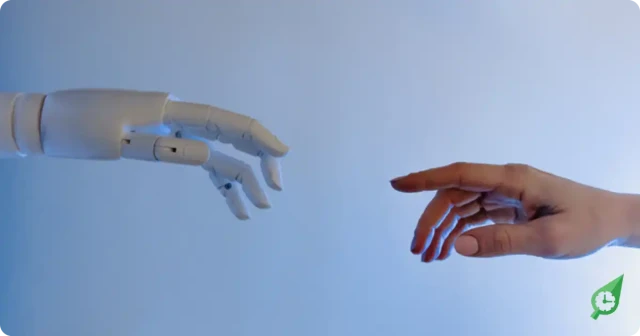Introduction
Companies must remain agile and efficient to stay ahead of the competition. One way to achieve this is by integrating cutting-edge technologies into their daily operations. Tools like the best roster apps offer advanced scheduling functionalities that work seamlessly with Xero insights, improving team coordination.

ChatGPT, a language model from OpenAI, also redefines communication and workforce management. In this post, we explore how ChatGPT can revolutionise workforce scheduling, streamline communication, and enhance decision-making processes. By weaving ChatGPT's capabilities into what many consider the best rostering system in Australia, businesses can stay ahead of the curve in productivity and employee satisfaction. Welcome to the era of ChatGPT-powered systems, where adaptability and innovation drive success.
Traditional methods of rostering vs. the need for innovation
In the past, many businesses—large and small—used paper or simple spreadsheets to create an employee roster. These manual methods often wasted time, caused errors, and adapted poorly to changing business needs.
As businesses grew more complex, managers needed faster and more reliable ways to create rosters. This demand led to automated roster software and Tanda alternatives as well as Deputy alternatives. Such tools help managers save time and reduce errors. Key benefits include:

- Time and cost savings: Automated rostering handles routine tasks such as shift calculations and attendance tracking, helping businesses save money.
- Real-time data: Online platforms provide immediate insights into employee availability, labour costs, and sales trends, enabling more informed decisions.
- Improved communication: Managers and employees collaborate seamlessly by handling shift swaps, leave requests, and feedback within one central system.
- Compliance assurance: Automated solutions help businesses meet labour regulations, including overtime rules, break requirements, and award interpretations. For instance, seven-day shiftworker rules can be integrated into scheduling logic.
Transformation of rostering with chatgpt
Effective workforce management is essential for any successful business. Manual methods once dominated scheduling, but ChatGPT offers a more efficient, user-friendly approach. Managers can use these insights in conjunction with the best employee scheduling apps to simplify daily operations.

Chatgpt's role in rostering efficiency
ChatGPT uses advanced language-processing capabilities to save time and effort when managing employee schedules. It can:
- Assign shifts automatically: ChatGPT analyses employees’ availability, skills, and preferences to allocate optimal shifts and maintain full coverage.
- Optimise schedules: It examines peak demand times and lines them up with employee availability, preventing under- or over-staffing.
- Forecast future needs: ChatGPT relies on historical data to anticipate upcoming staffing demands, helping businesses avoid shortages or surpluses. For more in-depth strategies, companies can consult this employee scheduling guide .
- Reduce errors: By processing scheduling data accurately, ChatGPT minimises mistakes in shift allocation and pay calculations, ensuring compliance with labour regulations. It also helps reduce time theft by offering more transparent record-keeping.
- Adjust in real time: Managers can quickly update schedules when staffing levels change, ensuring business continuity. ChatGPT’s logic also supports real-time availability updates from employees.
- Personalise rosters: ChatGPT tailors schedules to each employee or department, boosting overall satisfaction. This includes the ability to roster by skillset for specialised roles.
Case studies and hypothetical scenarios

ChatGPT benefits businesses of all sizes and in various industries:
- Retail Chain: By analysing past sales data, weather patterns, and employee schedules, ChatGPT forecasts staffing needs, reducing overtime costs and improving customer service.
- Healthcare Facility: A hospital can use ChatGPT to schedule hundreds of nurses with different specialities and availabilities. It also ensures compliance with labour laws, optimising day and night shift rosters.
- Restaurant: ChatGPT handles last-minute shift changes and time-off requests effortlessly. Employees submit requests for auto shift swaps through a user-friendly interface, and ChatGPT updates the roster in real time.
Embracing ai for rostering: challenges and considerations
AI-driven scheduling can help businesses manage their workforces more effectively and boost productivity. However, managers should address a few challenges:

Technical challenges
- Data Accuracy: AI algorithms need reliable data, such as employee profiles, sales patterns, and labour rules, to perform well.
- Bias Prevention: Businesses must ensure the algorithm uses unbiased training data, so it does not favour certain employees unfairly.
- Transparency: Employees should understand how the system makes scheduling decisions, which fosters employee accountability.
Ethical considerations
Data Privacy: AI can collect large amounts of employee data, raising privacy concerns. Clear policies must govern data handling and usage. For example, you can review human resources guidelines on changing rosters or ordinary hours of work.
Human Involvement: AI excels at routine tasks, but managers should remain involved to ensure fair treatment, prevent burnout, and handle unique cases.
Limitations of ChatGPT: Although ChatGPT is powerful, it may not account for every interpersonal dynamic, abrupt change, or nuanced emotional factor. It also lacks the empathy needed to balance factors like team morale when allocating shifts.
Human oversight in ai-assisted rostering

While AI automates administrative tasks and delivers data-driven insights, human oversight remains critical. People contribute in three key areas:
- Establish guidelines: Managers define policies and parameters, ensuring the system aligns with organisational values and legal requirements. This might include following standards for reasonable overtime in Australia.
- Monitor performance: Human oversight detects issues such as errors or biases. If problems arise, managers can adjust the algorithm or data inputs.
- Handle exceptions: Employees occasionally face special circumstances that require personal attention or flexibility beyond the AI’s scope.
Understanding the future of ai in rostering
AI-powered workforce management marks a significant leap in efficiency. As AI systems like ChatGPT continue to evolve, they will analyse increasingly complex data, adapt to feedback, and produce highly tailored rosters. Integrating these solutions with time and attendance features helps businesses gain a holistic view of labour management.
Emerging trends and future developments

Predictive scheduling: AI will rely on historical patterns and real-time data to proactively adjust staffing.
Enhanced collaboration: AI platforms will process employee requests and feedback in real time,
improving transparency.
Conflict resolution: AI can detect scheduling conflicts, such as overlapping shifts, keeping operations seamless.
Continuous learning and adaptation
AI thrives by continuously learning from real-world data. Managers play a vital role by overseeing its decisions and ensuring the algorithm remains fair and ethical. Transparent, explainable AI builds trust among employees and stakeholders, and can even support Fair Work compliance.
AI tools like ChatGPT promise to automate repetitive tasks, optimise shift patterns, and enhance employee satisfaction. Yet, managers must address technical and ethical considerations thoughtfully.
Transformative potential of chatgpt
ChatGPT stands out for its language processing and data analysis capabilities. It:
- Aligns employees more effectively: ChatGPT considers staff preferences and availability to build balanced, flexible rosters.
- Forecasts demand: It uses past patterns to anticipate staffing needs, minimising over- or under-staffing.
- Reduces costs: It helps businesses cut overtime and avoid employee burnout, improving both bottom-line results and workplace culture. Some businesses also explore free HR tools in tandem with ChatGPT to manage broader HR functions.

Embracing the future of rostering
The future of workforce scheduling depends on combining AI capabilities and human expertise:
- AI-powered automation: Routine tasks are streamlined, backed by data-driven insights, to create efficient rosters.
- Human fairness and empathy: Managers ensure equitable decisions, address exceptions, and recognise employee morale—areas that AI alone cannot fully handle.
By embracing AI-driven rostering solutions like ChatGPT, organisations gain better workforce management, a stronger bottom line, happier employees, and a crucial competitive edge. Many also look to solutions with workforce management integrations to streamline end-to-end operations.
Ready to discover how ChatGPT can transform your rostering? Integrate AI into your scheduling workflow to boost efficiency, reduce costs, and keep employees satisfied.



